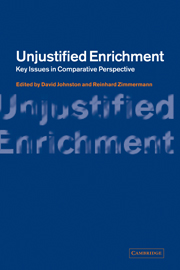Book contents
- Frontmatter
- Contents
- List of contributors
- Preface
- Table of cases
- List of abbreviations
- I Introduction
- II Enrichment ‘without legal ground’ or unjust factor approach
- III Failure of consideration
- IV Duress and fraud
- V Change of position
- VI Illegality
- VII Encroachment and restitution for wrongs
- VIII Improvements
- 14 Mistaken improvements and the restitution calculus
- 15 Enrichment by improvements in Scots law
- IX Discharge of another person's debt
- X Third-party enrichment
- XI Proprietary issues
- XII Taxonomy
- Index
14 - Mistaken improvements and the restitution calculus
Published online by Cambridge University Press: 31 July 2009
- Frontmatter
- Contents
- List of contributors
- Preface
- Table of cases
- List of abbreviations
- I Introduction
- II Enrichment ‘without legal ground’ or unjust factor approach
- III Failure of consideration
- IV Duress and fraud
- V Change of position
- VI Illegality
- VII Encroachment and restitution for wrongs
- VIII Improvements
- 14 Mistaken improvements and the restitution calculus
- 15 Enrichment by improvements in Scots law
- IX Discharge of another person's debt
- X Third-party enrichment
- XI Proprietary issues
- XII Taxonomy
- Index
Summary
The measure of recovery
Mistaken improvements are interesting because they give rise to some of the most revealing real-life restitution claims in respect of non-money benefits. Such claims expose the underlying structure of restitution in a way that money claims usually do not, because they implicate important questions that are usually elided by a claim in respect of a money payment: what ought to be accounted a benefit, and how should it be measured? The observation that the mistaken improver sometimes recovers in circumstances where the benefit to the defendant, on any measure, is doubtful at best, leads to the even more fundamental question of what ‘restitution’ is really about after all.
The inherent attraction of the resulting problems may be judged by the fact that even in English law – where, according to the best authorities, actual instances of restitutionary recovery in favour of a mistaken improver are virtually non-existent – there is nevertheless a highly developed theoretical account of what the shape and the justification of the remedy ought to be, if only it did exist. The American law of mistaken improvement, by comparison with the English, offers less theory and more practice. Not only is mistaken improvement a relatively common phenomenon with us – it is customary to attribute the incidence of the problem to the chaotic land titles of an earlier day, as well as to the difficulties of surveying the wide open spaces – but the improver's claim is far more likely to succeed.
- Type
- Chapter
- Information
- Unjustified EnrichmentKey Issues in Comparative Perspective, pp. 369 - 383Publisher: Cambridge University PressPrint publication year: 2002
- 2
- Cited by



